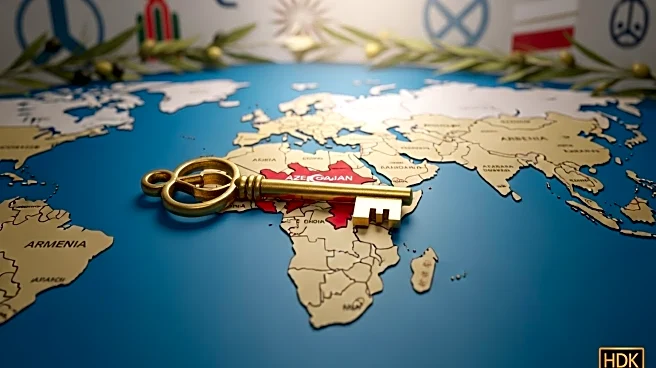What's Happening?
President Trump has been recognized for his significant involvement in the Armenia-Azerbaijan peace process. Armenian Prime Minister Nikol Pashinyan and Azerbaijani President Ilham Aliyev have both expressed gratitude for Trump's dedication and principled approach, which they believe made the peace initiative possible. This acknowledgment came during speeches at the United Nations General Assembly, where leaders from around the world discussed various global issues. Trump's involvement is seen as opening a new chapter in U.S.-Azerbaijan relations, highlighting the importance of U.S. diplomatic efforts in resolving international conflicts.
Why It's Important?
The involvement of President Trump in the Armenia-Azerbaijan peace process underscores the United States' influential role in international diplomacy. Successful mediation in such conflicts can enhance U.S. standing as a global peacemaker and strengthen bilateral relations with countries involved. For Armenia and Azerbaijan, the peace process offers a chance to stabilize the region, potentially leading to economic growth and improved security. The U.S. gains diplomatic leverage and can use this success to bolster its foreign policy agenda, promoting peace and stability in other conflict zones.
What's Next?
The peace process between Armenia and Azerbaijan, facilitated by President Trump, is expected to continue with further diplomatic engagements. Both countries may seek to solidify agreements and work on implementing peace terms. The U.S. might continue to play a supportive role, ensuring that the peace process remains on track. Other international stakeholders, including the United Nations, could be involved in monitoring and supporting the implementation of peace agreements. The success of this initiative may encourage similar diplomatic efforts in other regions.
Beyond the Headlines
The peace process between Armenia and Azerbaijan, with U.S. involvement, could have broader implications for international diplomacy. It highlights the potential for U.S. leadership in resolving complex geopolitical conflicts. The success of this initiative may inspire other nations to seek U.S. mediation in their disputes, reinforcing the U.S. as a key player in global peace efforts. Additionally, it may influence U.S. foreign policy strategies, emphasizing diplomatic solutions over military interventions.










